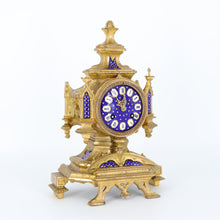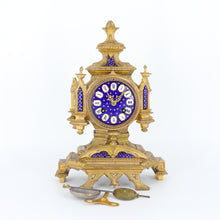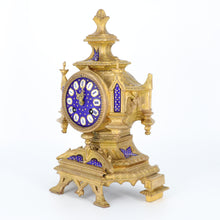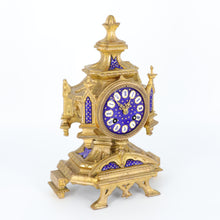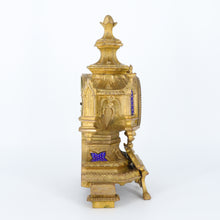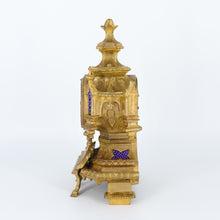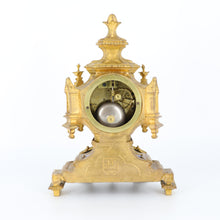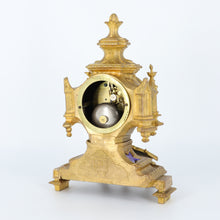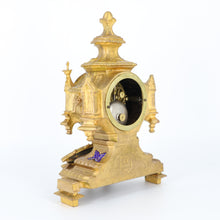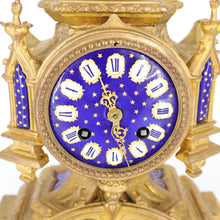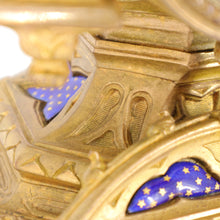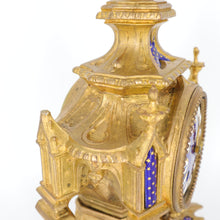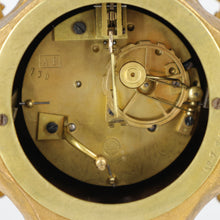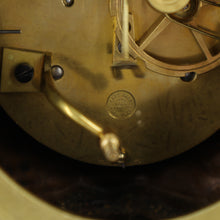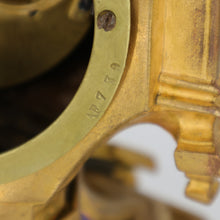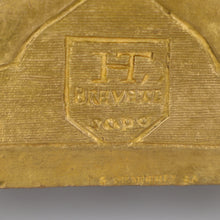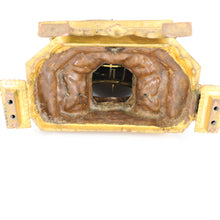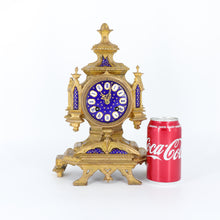
Overview
A rare antique Ormolu Mantel Clock made by Philippe Mourey and Japy Frères, dated 1863. The gilt case is of the shape of a castle, with Coalport Blue porcelain plaque and stars on it. The shape of the case and the pattern on the dial is patented, so the clock is a rare find. The clock uses Brocot suspension and is in fully working order, keeping perfect time. This is a very rare timepiece, of collection quality.
Highlight
- Coalport Blue hand painted Star dial and panels with nice details, very rare (patented)
- the architectural castle design of the case, very rare (patented)
- fully working, keeping perfect time
Details
- a 2-train clock (time + strike)
- architectural castle design of the case, very rare (because it’s patented)
- enamel dial with Roman numerals
- Coalport Blue hand painted Star dial and panels, very rare (because it’s patented)
- case and movement are original, both numbered 739
- French round 8-day spring driven movement
- use Brocot Suspension
- use Count Wheel Striking Mechanism
- striking on each half and full hours
- marked “Breveté, SGDG” on the case, means patented
- signed “3 PH Mourey 63” on the case, maker of the case
- signed “Japy Fils 1855 Expos Medailles (1844-1849)” on the movement, maker of the movement
- marked “AF” on the movement and the case, possibly the finisher
- include a pendulum and a winding key
Period
- signed 1863 on the case by the maker
Style
- mantel clock
- ormolu clock
- architectural design
- enamel panel design
Maker
- French
- case: Philippe Mourey
- movement: Japy Frères (Japy Fils is one of the marks of Japy Frères)
Size
- 32 cm H / 21.5 cm W / 11.5 cm D
- 12.5 inch H / 8.5 inch W / 4.5 inch D
Material
- ormolu case
- brass movement
- enamel dial and panels
Condition
- overall good condition
- fully working, keeping perfect time
- dial and panels in excellent condition
- gilding on case has sign of age
Philippe Mourey - Sculptor, Clockmaker (French, 1840 - 1910)
Philippe Mourey is a French Sculptor and Clockmaker. His work is most commonly marked as PH Mourey along with the month and the year.
Philippe Mourey is best known for his association with Japy Freres, the noted 19th Century French Clockmaker Company.
Philippe Mourey commonly marks his work “PH Mourey”.
Japy Frères - Clockmaker Company (French, founded in 1806)
Japy Frères is a famous French clockmaker. It was a pioneer in the ideology of industrialization of not only clocks, but of manufacturing in general. Its enamel dials and movements became the standard for the great majority of clock manufacturers in the 19th Century both in France and abroad. There are few French carriage clocks in existence that do not have Japy enamel dials on them.
Frédéric Japy (1749-1812) was born in a wealthy family in France. From childhood, he was introduced to craft activities and learned to live in a structured and supportive business environment. Frédéric was apprenticed by his grandfather, and then began his career as a watchmaker.
In the 1770s, watch and clock parts were usually manufactured by hand by specialized workers in their homes, then collected and mounted into a piece by an 'assembler', which was not very efficient. Frédéric invented the idea - a manufacturing plant - to standardize the pieces and ensure the quality of the production. He grouped workers into one location and assigned each one with a specific work post with its own specific machine. Frédéric radically changed the way clocks were produced. The sequential production of parts in one location reduced the number of steps and operations, and cut the time by half.
In 1806, Frédéric handed the direction of his businesses to his three sons, and it became Japy Frères.
Japy Frères exhibited its work at a lot of important exhibitions, and won a number of gold medals, silver medals and awards throughout the first half of the 19th century. In 1855, it earned its Great Medal of Honor at the 1855 Exposition Universelle in Paris.
Japy Frères commonly marks their work “Japy Frères” or “Japy Fils”.
Breveté, SGDG - (Stamp on Clocks)
Breveté means “patented” in French. It is the legal registration of some elements of the clock or the all of it. Lots of clocks produced between 1850 and 1950 have that word stamped on the back, along with an abbreviation SGDG. SGDG means 'Without any guarantee from the Government' (Sans Garantie Du Gouvernement) and was by law required to be stamped on all objects with a legal patent from 1844 to 1968, especially those manufactured for export.





















